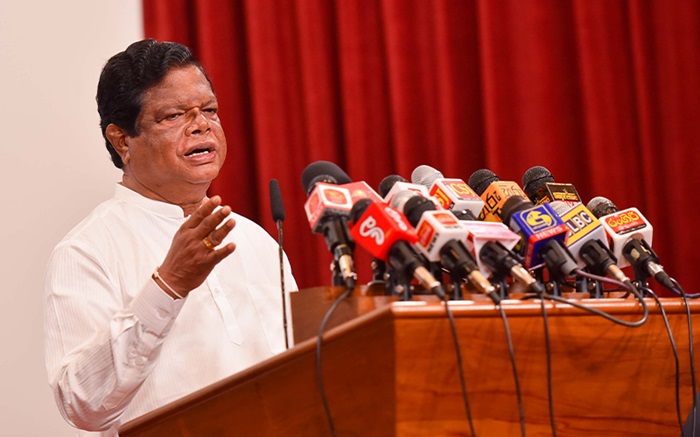
The existing national debt stands at approximately US$ 36 billion, with only 37% of this debt slated for payment within the next 5 to 6 years, and 51% of the loan amount scheduled for repayment between 6 and 20 years, Minister Bandula Gunawardena said.
Minister Bandula Gunawardena further said the remaining 12% is earmarked for settlement after the 20-year mark.
“It’s crucial to acknowledge that irrespective of the governing party, the country is obligated to service this debt until the year 2048. Failure to meet these financial commitments would result in a governing party’s ability to administer the government for only a two-week duration,” he warned.
Minister Bandula Gunawardena pointed out that avoiding loans from global entities and defaulting on payments poses a critical challenge, as the current international system relies on this financial mechanism.
“In addition, the refusal of other nations to accept letters of credit issued by Sri Lanka would hinder the importation of vital commodities such as petroleum, gas, medicines and essential food items. Consequently, political solutions prove ineffective in addressing this predicament; instead, the imperative lies in implementing an economic solution to navigate through these challenges,” he said.
The Minister revealed that a strategic approach involves focusing on four key aspects to navigate the country out of the current economic crisis.
“Firstly, there is an imperative to enhance government revenue. Secondly, it is essential to curtail both recurrent and capital expenditures of the government. The third element involves boosting foreign exchange inflows while concurrently minimizing foreign exchange outflows. Lastly, the goal is to establish a current account surplus in the balance of payments. The budget presented by the President for the year 2024 is aligned with these crucial objectives,” he said.
The Minister of Transport, Highways and Mass Media reiterated that addressing the prevailing crisis in the country requires an exclusive focus on economic solutions and highlighting the inadequacy of political measures in this context.
He highlighted that once the International Monetary Fund (IMF) issues the second loan instalment, it will pave the way for the resumption of all stalled development projects.
Characterizing this year’s budget, presented by President Ranil Wickremesinghe, as historic, radical and revolutionary, he highlighted its significance as the first budget unveiled following the official declaration of the country’s bankruptcy last year.
The Minister underscored that the state budget’s current account deficit and the international balance of payments current account deficit were pivotal factors leading to the country’s financial crisis. He further revealed that the failure to meet International Monetary Fund criteria during the respective periods was a contributing factor to the current crisis.
“President Ranil Wickremesinghe assumed responsibility amid financial management challenges. A resolution was achieved through debt restructuring, involving consultations with leaders from creditor states, including India, China and Japan.
“Following the budget, the International Monetary Fund is expected to issue the second loan tranche. Successful refinancing of the debt would provide ample resources to execute all the proposals outlined in the budget. Subsequently, the revival of all stalled development projects becomes feasible.
“Everyone must bear in mind that the anticipated increase in government employees’ salaries, as per the budget, is contingent upon the tax revenues collected by the government from the public,” he added.
Minister of Transport, Highways and Mass Media, Bandula Gunawardena revealed this information during a Media briefing held at the Presidential Media Centre on Wednesday (15). (NewsWire)